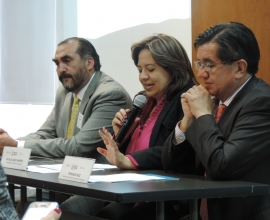Colombia takes a significant step in primary healthcare
The Colombian Deputy Minister of Public Health and Services, Fernando Ruíz Gómez, along with the Deputy Minister of Higher Education, Natalia Ariza Ramirez, presented the national roadmap for training family doctors.
The result of intense collaborative work between over 20 universities, the two ministries and the stakeholders in the health and education system, this roadmap represents a milestone in the reform of the health system and paves the way for training 5,000 family doctors in 10 years (Ten-Year Plan for Health 2012-2021). In the words of the Deputy Minister, this roadmap “seeks to contribute to eliminating the current fragmentation in the health system, as well as to guaranteeing the equity and accessibility of health services for Colombians, regardless of their population group”. She also emphasised that for the first time all the stakeholders were brought together to create the programme for a medical speciality.
The training roadmap is part of the new Comprehensive Healthcare Model (MIAS), the design and implementation of which were supported by the European Union's EUROsociAL cooperation programme. The MIAS represents a national framework to promote the development of territorial models based on primary healthcare with a family and community orientation. It represents a paradigm shift which lays the groundwork for a true national public primary healthcare system. The MIAS will make it possible to “guarantee comprehensive healthcare in the individual and collective dimension, even in terms of social determinants, and will incorporate more humane and personalised treatment for everyone in the population”, stressed the Deputy Minister at this public event. In December 2014, Decree 2561, the first territorial model for the Department of Guainía, was approved.
EUROsociAL provided essential input in this process by sharing the experiences of the United Kingdom, Spain, France, Brazil and Mexico. Specifically, the creation of the training roadmap benefited from the support of Miguel Ángel Fernández, a Mexican family doctor and the Vice President of the Mesoamerican region of the Association of Family Doctors.
FIIAPP

